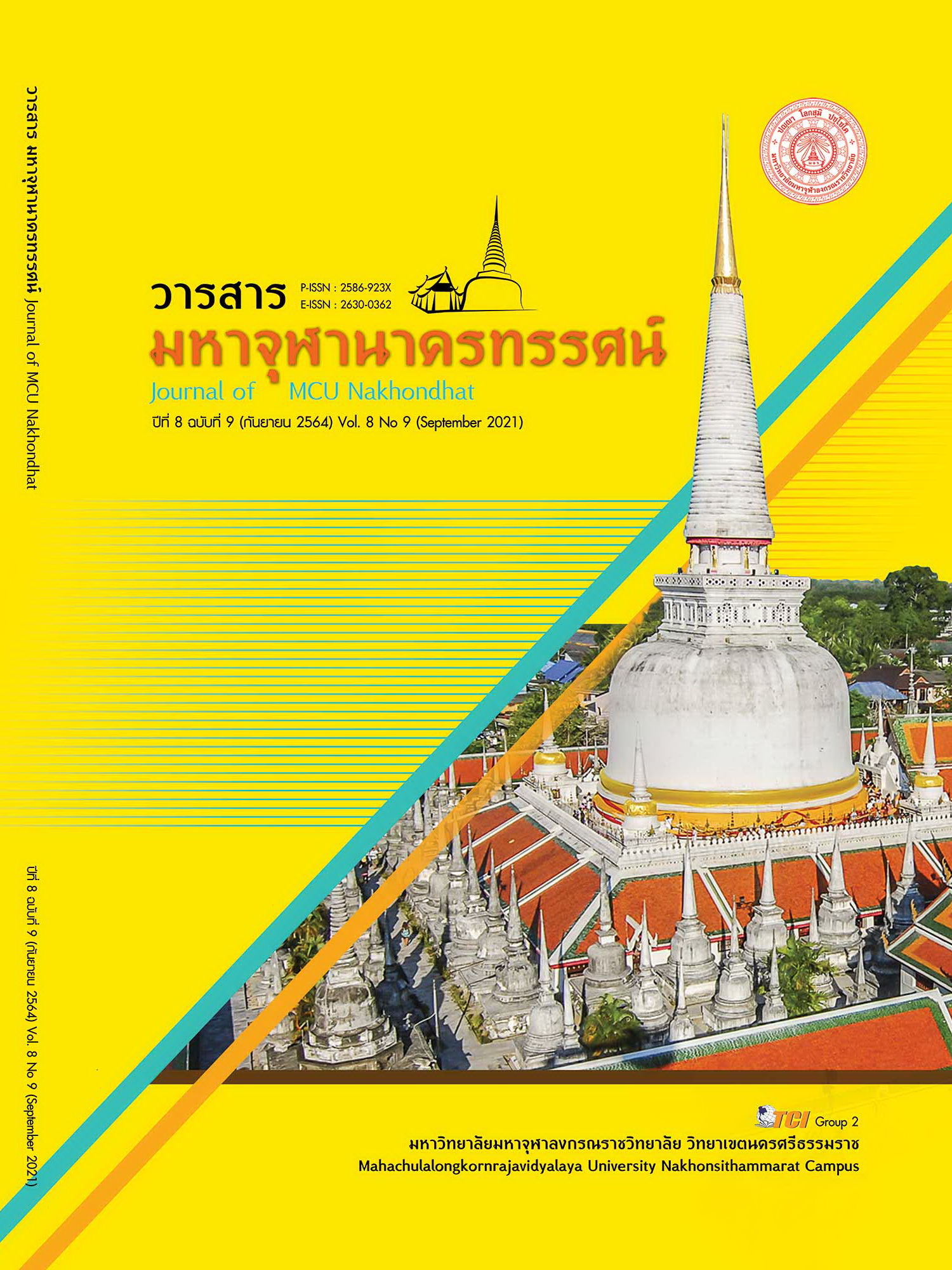PERCEPTION AND GUIDELINES TO DRIVE THE CIRCULAR ECONOMY CONCEPT FOR PLASTIC WASTE MANAGEMENT THE 3Rs PRINCIPLE IN THE NONTHABURI CITY MUNICIPALITY
Main Article Content
Abstract
The objectives of this research were to 1) study the perception of approaches for driving the circular economy concept for plastic waste management under the 3Rs principle of personnel both at the policy and operational level of the Nonthaburi Municipality and 2) suggest guidelines for driving the circular economy concept for plastic waste management of the Nonthaburi Municipality, using qualitative research methodology, interviews and non-participant observations. The researcher selected a specific sample group, namely eight personnel at both the policy and operational levels. The researcher used a semi-structured interview to study the circular economy drive approach for plastic waste management under the 3Rs principles, consisting of situations/problems management, municipal/relevant management and applying circular economy concepts to management. The results showed that 1) personnel at both policy and operational levels have the same view and awareness of the circular economy concept. The circular economy has not yet been taken into account as part of the municipal planning policy. There is only the implementation of the 3Rs principle: reduce, reuse and recycle, called the sustainable solid waste management project. It focuses on four types of waste: organic waste, recycled waste, hazardous waste and general waste. It was done holistically, not separating plastic waste specifically. Expecting to receive central support in the future including a budget, training and public relations principles of operations in the circular economy to allow operators to start taking action in this matter seriously. 2) A knowledge management system on plastic waste management should be developed in line with the circular economy and a network of cooperation in united local administration organizations to create an organization of learning and working together.
Article Details
References
ธงพล พรหมสาขา ณ สกลนคร. (2562). แนวทางการส่งเสริมแนวคิดระบบเศรษฐกิจหมุนเวียนขององค์กรปกครองส่วนท้องถิ่นเพื่อการพัฒนาชุมชนอย่างยั่งยืน. ใน วิทยานิพนธ์ศิลปศาสตรมหาบัณฑิต สาขาพัฒนามนุษย์และสังคม. จุฬาลงกรณ์มหาวิทยาลัย.
บุคลากรระดับนโยบาย. (25 มิถุนายน 2564). การรับรู้แนวทางการขับเคลื่อนแนวคิดเศรษฐกิจหมุนเวียนเพื่อการจัดการขยะพลาสติกภายใต้หลัก 3Rs. (ชไมกานต์ ดวงแก้ว, ผู้สัมภาษณ์)
บุคลากรระดับปฏิบัติงาน. (25 มิถุนายน 2564). การรับรู้แนวทางการขับเคลื่อนแนวคิดเศรษฐกิจหมุนเวียนเพื่อการจัดการขยะพลาสติกภายใต้หลัก 3Rs. (ชไมกานต์ ดวงแก้ว, ผู้สัมภาษณ์)
ประชาคมวิจัยด้านเศรษฐกิจชีวภาพ เศรษฐกิจหมุนเวียนและเศรษฐกิจสีเขียว. (2561). สมุดปกขาว BCG in Action การพัฒนาวิทยาศาสตร์ เทคโนโลยีและนวัตกรรมของประเทศไทย เพื่อเศรษฐกิจชีวภาพ เศรษฐกิจหมุนเวียนและเศรษฐกิจสีเขียว. กรุงเทพมหานคร: ประชาคมวิจัยด้านเศรษฐกิจชีวภาพ เศรษฐกิจหมุนเวียนและเศรษฐกิจสีเขียว.
พัชรนันท์ รักพงษ์ไทย. (2560). มาตรการทางกฎหมายในการส่งเสริมการนำขยะมูลฝอยจากครัวเรือนประเภทพลาสติกกลับมาใช้ใหม่ (Recycle). ใน วิทยานิพนธ์นิติศาสตรมหาบัณฑิต สาขากฎหมายทรัพยากรธรรมชาติและสิ่งแวดล้อม. มหาวิทยาลัยธรรมศาสตร์.
ภิศักดิ์ กัลยาณมิตร และวชิรวัชร งามละม่อม. (2561). แนวทางการพัฒนาการจัดการขยะมูลฝอยขององค์กรปกครองส่วนท้องถิ่น. วารสารวิชาการแพรวากาฬสินธุ์ มหาวิทยาลัยกาฬสินธุ์, 5(1), 172-193.
รติมา คชนันทน์. (2562). เศรษฐกิจหมุนเวียน (Circular Economy). กรุงเทพมหานคร, สำนักวิชาการ สำนักงานเลขาธิการสภาผู้แทนราษฎร.
ศูนย์เรียนรู้สุขภาวะ สำนักงานกองทุนสนับสนุนการสร้างเสริมสุขภาพ. (2562). GO ZERO WASTE ชีวิตใหม่ไร้ขยะ. (พิมพ์ครั้งที่ 1). นนทบุรี: บริษัท มิชชั่น อินเตอร์ พริ้นท์ จำกัด.
สันชัย พรมสิทธิ์ และคณะ. (2562). รูปแบบการจัดการขยะกับความเหมาะสมของพื้นที่องค์กรปกครองส่วนท้องถิ่น. วารสารบัณฑิตศึกษามหาจุฬาขอนแก่น, 6(2), 459-483.
สำนักทะเบียนท้องถิ่นเทศบาลนครนนทบุรี. (2564). ข้อมูลทั่วไป เทศบาลนครนนทบุรี. เรียกใช้เมื่อ 2 กรกฎาคม 2564 จาก https://www.nakornnont.go.th/content/general
สุนันทา พลทวงษ์ และคณะ. (2561). คู่มือปฏิบัติการ 3 ใช้ (3R) เพื่อจัดการขยะชุมชน. (พิมพ์ครั้งที่ 2). กรุงเทพมหานคร: บริษัท ฮีซ์ จำกัด.
เอกรินทร์ ตั้งนิธิบุญ และ ธิติมา เกตุแก้ว. (2562). ชุมชนต้นแบบการจัดการขยะมูลฝอยด้วยแนวคิดขยะเหลือศูนย์ (Zero Waste) ของชุมชนพูนบำเพ็ญ แขวงภาษีเจริญ กรุงเทพมหานคร. ใน การสนับสนุนจากงบประมาณแผ่นดิน สำนักงานคณะกรรมการวิจัยแห่งชาติ. มหาวิทยาลัยราชภัฏธนบุรี.


